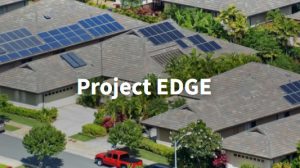
Project EDGE recognizes that as the volume of DER providing services increases, it is important to ensure the integrity of the poles and wires that houses are connected to.It is a world-first project that brings together the spectrum of relevant stakeholders across the electricity value chain: customers, DER owners, aggregators, distributors, the system/market operator and researchers.
Several innovations will be demonstrated through trials that will test operating envelopes and the trading of local services. A key advantage of using operating envelopes is that it allows distribution companies to ensure network integrity without having direct control of DERs or the aggregator. This makes better use of existing infrastructure and increases the efficiency of the overall electricity value chain. Ultimately, it should help to reduce electricity costs for consumers in Australia. Project EDGE will also inform ongoing efforts on future electricity market design, particularly so-called two-sided markets.
Operating envelopes are time-varying export or import limits calculated by distribution companies (who manage the poles and wires), in real time or in advance, at the connection point of the customer (where the meter is). This information is then given to aggregators who must adhere to it when managing their DER portfolios. While operating envelopes can ensure network integrity, implementing them in practice can be challenging, ranging from different data requirements (accurate network models, smart meter data, forecasts, etc.) to social and economical considerations (market design, consumer acceptance, fairness, etc.).